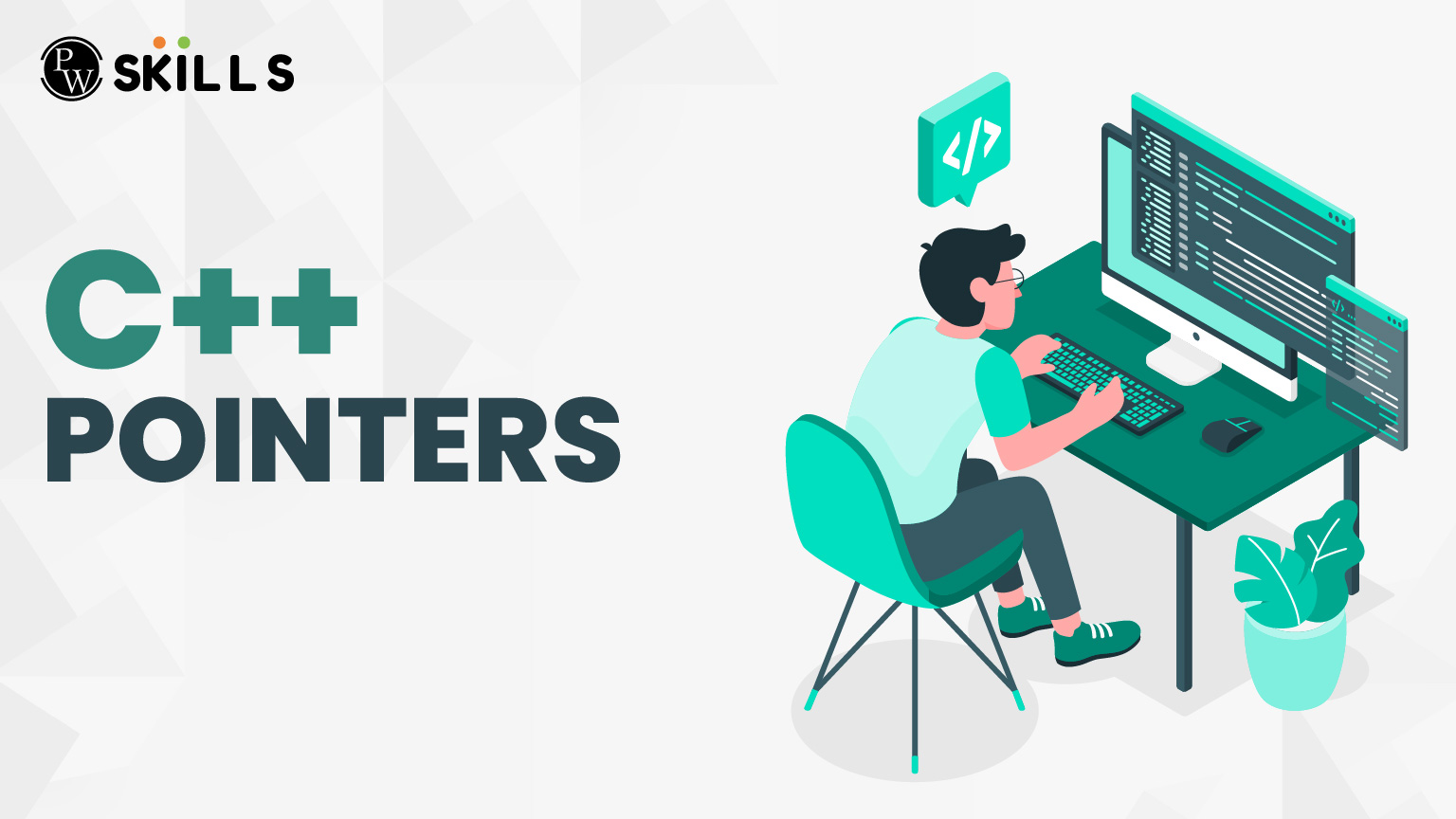If you’re diving into the world of C++ as you keep hearing the term “C++ Pointers,” then you are not alone. Pointers can seem a little scary at first, also this is true whether you’re a student just getting started with coding. This is also valid should you be a working professional improving programming knowledge. Once you have a comprehension of them, you’ll realize their power along with their necessity. They can be necessary within the making of your own C++ programs that are more efficient and dynamic.
What Are Pointers in C++?
We should simplify it before defining it sophisticatedly. C++ pointers are variables holding the memory address of other variables. It is like a signboard for the location of a house. Your variable exists as the house. The pointer is there to help you reach for the variable. You work with where that value stores instead of working directly with the value. And that opens up a whole new way. It manages data within memory.
Now, for what reason is it that we are needing pointers? What purpose do they serve for? The solution enables control and flexibility. It is possible for us to manipulate memory directly when we are using pointers. Direct memory manipulation occurs at that time. That could sound complex, and yet it is helpful in areas like dynamic memory allocation, when working with arrays, and when passing large structures to functions efficiently.
Pointer Declaration in C++
In C++, at times when we do declare Pointers, we tell the compiler of something. We want to create a variable for storing a memory address. Like this goes the syntax: int* upon ptr. Ptr is a pointer to an integer here. Pointers to user-defined types along with double, char, and float data types in addition to other data types can be declared also.
It is important to note that the * symbol makes this variable be a pointer. Thus, int* is indicative of a pointer for an integer. We usually use the address-of operator & in order to get the memory address of another variable when we assign it. For example:
int x = 10;
int* ptr = &x;
Here ptr stores x’s memory address. Printing *ptr results in x’s value which happens to be 10. Dereferencing means that you should use * in order to get at the value that is stored at a memory address.
Initialization of Pointers
Pointer initialization is important. Like driving a car when you don’t know where you’re going, an uninitialized pointer can crash your program. When declaring a pointer within C++, assign it a valid address or set that pointer to nullptr.
For instance:
int* ptr = nullptr;
From this, the compiler knows ptr does not currently point to valid memory. It is a safe thing if you work to avoid the undefined behavior that is caused by accessing garbage values. You can assign its address to ptr later after a valid variable exists. Proper initialization helps in avoiding segmentation faults which are indeed hard for debugging and are frustrating.
Types of Pointers in C++
It is easier to write code that is flexible and powerful when you are understanding the different Types of Pointers in C++. Types that are most common include some among:
Null Pointer
A pointer with no point toward any memory location: Null Pointer. It’s declared using nullptr. Error handling is helped by this kind of type.
Void Pointer
A void pointer, a generic pointer, can be pointed to by any data type. You cannot directly dereference it. Typecasting is required.
Dangling Pointer
A pointer to a memory that is deallocated or to memory that has been deleted. Unexpected bugs can occur.
Wild Pointer
Wild Pointer is like a pointer that has not yet been initialized. A memory location that is unknown may be indicated.
Smart Pointer
Smart Pointer in modern C++ automatically manages memory for you. They are a part of the STL or Standard Template Library for prevention of memory leaks.
Each one of these has certain use cases and precautions. You will know of the time when you can use which one as you get more experience. Knowing these helps build a solid foundation even from the beginner level.
Advantages of Using Pointers in C++
Let us now move to the reasons why so many developers rely on pointers.
- Pointers are widely used across many reasons. In C++ using pointers has many advantages. They allow dynamic memory allocation that means memory is allocatable during runtime not at compile time.
- Pointers are useful in the process of creating complex data structures. Trees, graphs, and also linked lists are examples that show these structures.
A lot of the advanced algorithms and applications have these as a backbone of theirs. They give you control about the way your data is stored and the way it is accessed. These enable array and string creation as well. You can manipulate them with more flexibility.
How Pointers Enhance Performance
Pointers can make a large difference when writing efficient code, especially within systems programming. Imagine that you work using image data or one large file. Copying the whole function would consume lots of time. Instead, due to the fact that it passes its pointer, it is in the same way that it sends a location reference. It’s faster, plus it takes up less memory.
Pointers play a key role within modern-day applications like OS-level programming or game development. For the sake of memory management along with accessing hardware and also interacting with lower-level APIs, they are used. Such tasks would be extremely inefficient or impossible except without C++ Pointers.
Real-Life Examples of C++ Pointers
Imagine you create a basic game. Each player has attributes such as their health, their position, and also score. For players, C++ Pointers let you dynamically allocate memory and update their data. You are also able to switch out players without the recreation of the object with them. Because of this, your code becomes modular. Additionally, it is the case that your code is memory-friendly.
A file editor is one more option available. As another example, one could build a file editor. You are able to allocate memory blocks for different parts that are in a file when you use C++ Pointers, and you can link those parts or manage undo-redo operations in an effective way. It’s not just about managing memory. Control management is also the subject.
Common Mistakes and How to Avoid Them
When you make mistakes, it’s natural if you’re new to pointers. Dereferencing uninitialized pointers or null pointers constitutes one common mistake. This is a problem. It causes runtime errors too. Prior to using a pointer, always check to see if it is nullptr. Another issue involves not freeing the memory once done. Be sure to delete to release memory in C++, if you allocate it using new.
int* ptr = new(int);
*ptr = 20;
delete ptr;
Forgetting to delete leads to memory leaks. In modern C++, smart pointers such as std::unique_ptr or std::shared_ptr help to solve this issue.
How to Learn C++ Pointers
Start with beginner-friendly C++ courses through platforms like Coursera, Udemy, or PW Skills, plus these courses cover fundamentals including pointers.
- Join structured bootcamps with doubt-solving and peer learning live sessions. These bootcamps do focus upon real-world problem-solving by use of C++.
- For their deep exploration of pointers related to arrays, linked lists, trees, and memory management, pick DSA-focused C++ programs.
- Pointer challenges are on LeetCode, HackerRank, and Codeforces. Interactive coding platforms prove useful with these challenges.
- In the case of explanations that are hands-on with some walkthroughs of pointer concepts going from basic ones to advanced ones, watch some YouTube tutorials.
- Acquire comfort in the usage of C++ Pointers within actual code through project-based learning such as the building of linked lists, memory managers, or simple games by manual effort.
Also Read:
- Proxy Pattern | C++ Design Patterns
- History Of C++ | Timeline (+Infographic), List Of Versions, & More
- Hanging the Exception Handling in C++: An Effective Guide
- Understanding the C++ Array: An Effective 11 Step Guide
Master Pointers & DSA with PW Skills DSA C++ Course
PW Skills offers a practical, beginner-friendly C++ DSA course as learning C++ Pointers with Data Structures and Algorithms is instead your goal. The course does walk you through each and every step. This is your starting point if you train for jobs or upskill for work.
C++ Pointers FAQs
Can I learn C++ Pointers without prior coding experience?
Yes, you can. Starting with beginner courses and practice projects helps you understand pointers gradually.
Are pointers still relevant in modern C++?
Absolutely. Even with modern features like smart pointers, traditional pointers remain essential in systems programming and performance-critical applications.
What's the best way to practice C++ Pointers?
Hands-on coding on platforms like LeetCode, solving pointer-related DSA problems, and building small memory-based projects is the most effective approach.


